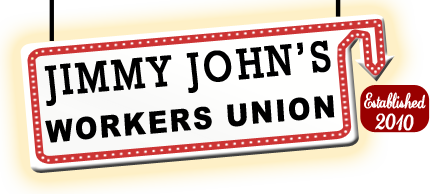There are plenty of reasons why fast-food has been totally non-union up until now. High employee turnover make it difficult organize before workers move on. Part-time schedules mean that workers are often busy with other jobs as well. And perhaps most of all, the low-wage fast-food industry has union busting down to a science. All of this has made traditional unions wary of organizing drives at fast-food chains. It looks like a big investment with little chance of success.
And that's where the Wobblies come in. The IWW was formed over a century ago as a union for all working people. The union grew in the early 1900s by organizing where other unions would not: migrant workers, unskilled immigrants, nonwhites, and women. Industries that were ignored by other unions became hotbeds of Wobbly activism. The IWW was far, far ahead of its time. For example, Wobblies were winning free speech fights with civil disobedience across the American West 56 years before the Free Speech Movement at Berkeley. Wobblies were organizing interracial unions in the Deep South 50 years before the Civil Rights Act.
So back to fast-food. The progressive movement and the middle class need a powerful labor movement as their foundation. A powerful labor movement will require unions in what are currently low-wage service sector jobs. These are the jobs that are increasing as a proportion of the overall economy, as heavily unionized manufacturing jobs continue to go overseas. Either we make the jobs of the new economy good ones, or we watch more and more Americans slip into poverty. Or as Jimmy John's Worker and IWW member Ayo Collins says,
"Service industry jobs are the future and our future needs to have quality jobs for working families with living wages, affordable healthcare, paid time off, consistent hours, and basic respect. It's time for change in America, we hope this will be a turning point for all workers."
So at a time when most progressive activists are focused on the upcoming midterm elections, let's not overlook what's happening in Minneapolis. And let's hope the Wobblies once again lead the way.
(This article was cross-posted at Daily Kos.)


2 comments:
Interesting. How would they solve the problem of prices going up in fast food restaurants? This would effectively work as a food tax on those who eat there (often other poor people like me). Besides a price increase, the other alternatives would seem to be to wrestle this extra money from shareholders (impossible) or more skilled workers in the company (improbable). Of course, the same question might have been raised for, say, coal miners and electricity prices, but I wonder how this plays out in real economics.
Also it seems to me that the more unskilled labor pays, the less incentive people have to learn a skill. All of us have been pushed by teachers who don't want us to 'wind up flipping burgers.' In a real-world decision scenario, this might play out as someone deciding that maybe they'll just stay in fast food rather than continuing their pharmacy tech program. McDonald's has even positioned its employment ads a stepping stone to something else (although the insinuation that McDonald's somehow directly helps you reach that goal is false).
Just thinking out loud, really. Not on one side or the other, but it's an interesting question.
A small raise for the sandwich makers wouldn't necessarily mean more expensive food. It could just mean slightly less money for the franchise owners. In this case, the JJ stores in question average $264,270 in profit per store per year. That means the owners, Mike and Rob Mulligan, are making with their 10 stores about $2.6 million in profit each year. Sure, they spend that money and it goes back into the economy and "trickles down" on low-wage workers. But increased wages for workers also go back into the economy. Supply-side vs. demand-side.
I see your point about incentives and unskilled vs. skilled labor. But in the grand scheme of things we're not talking about making burger flippers and brain surgeons have anything close to equal pay. We're talking about modest raises for the people at the bottom of the economy.
Sometimes we view discussions about wages as purely dollars-and-cents affairs. But there are externalities involved that are hard to measure economically and really get more into political, social, even spiritual issues. For instance, we have an economic system that consigns a huge proportion of the population to lifelong financial struggle, not as part of a a brief anomaly or crisis in the system, but as the perpetual consequence of the system. Staggering inequality is a requirement of the system. Is that really how we want to treat one another? If we were starting from scratch, is that the society we would want?
Post a Comment